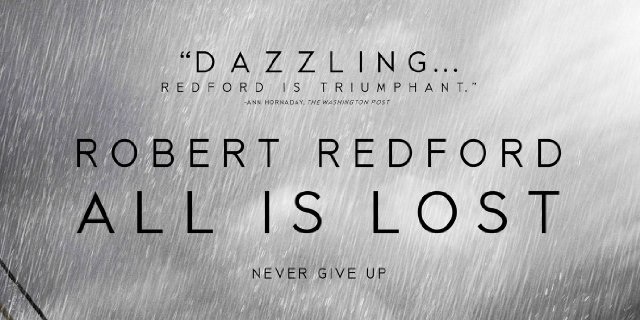Survival is humankind’s most primal instinct. Left for dead, with only – and sometimes less than – the bare necessities, we are bound to resort to the most drastic means in order to carry on with our lives.
Films that chronicle such feats of will (most recently Gravity, Life of Pi, and my personal favorite, The Grey) possess protagonists with compelling backstories – the audience is usually introduced to family and friends up front, making us invest in the return of the intrepid loved one they are missing. Otherwise, stories more focused on restraint disclose particular details throughout the arc of the story. Either way, an incentive is present for both viewers and characters.
And now comes J.C. Chandor’s All is Lost, utilizing neither of these methods, and, quite frankly, blowingPi and Castaway out of the water. Here we are given a nameless man with no discernible motivation for sailing across the Indian Ocean, where his small yacht floats thousands of miles from the Sumatra Straits. A series of exceedingly unfortunate events, the worst being a massively relentless storm, eventually forces him to set aside nautical ingenuity in favor of pure instinct.

As the sole onscreen presence, with only a handful of lines (and an appropriate four-letter lamentation), Robert Redford gives a beautifully simple performance that is both commanding and heartbreaking. His physicality is beyond impressive – Redford did his own stunts when shooting took place in the Pacific Ocean, as well as the same Baja stage Titanic was filmed on. It’s not just that at 77, he retains the same bare intensity displayed in Jeremiah Johnson, a thematically similar film – with age, Redford’s ability to build sympathy for a character we know absolutely nothing about is truly remarkable.
It may sound perplexing, but that lack of information only makes the Man’s journey all the more captivating. All is Lost wastes no time with impetus, a leap that pays off in spades and also gives the movie a unique flow that frequently hops back and forth between character study and a brilliant, straight-up action movie. The trust we build with Redford’s protagonist is not only a testament to his relatable movie star aura, but to the confident sophomore screenplay and direction from Chandor, whose previous film, Margin Call, occupied entirely different (read: land-oriented) territory. The film is technically flawless, with understatedly natural cinematography that frequently shifts from air to sea (and does so seamlessly), complemented by crisp editing that changes pace with every scene, and a haunting and unobtrusive score.
To marginalize All is Lost by assigning it one genre would be a disservice to the nimble way it permeates your mind and soul. It is alternately thrilling, crushing, and satisfying. But most importantly, its contemplations of mortality and how long one can persevere don’t feel manufactured – they come to bear through Redford’s performance and Chandor’s solemn helming. In the darkest of times, we believe in this Man, willing him to safety – that’s the most you can ask from a film like this.






